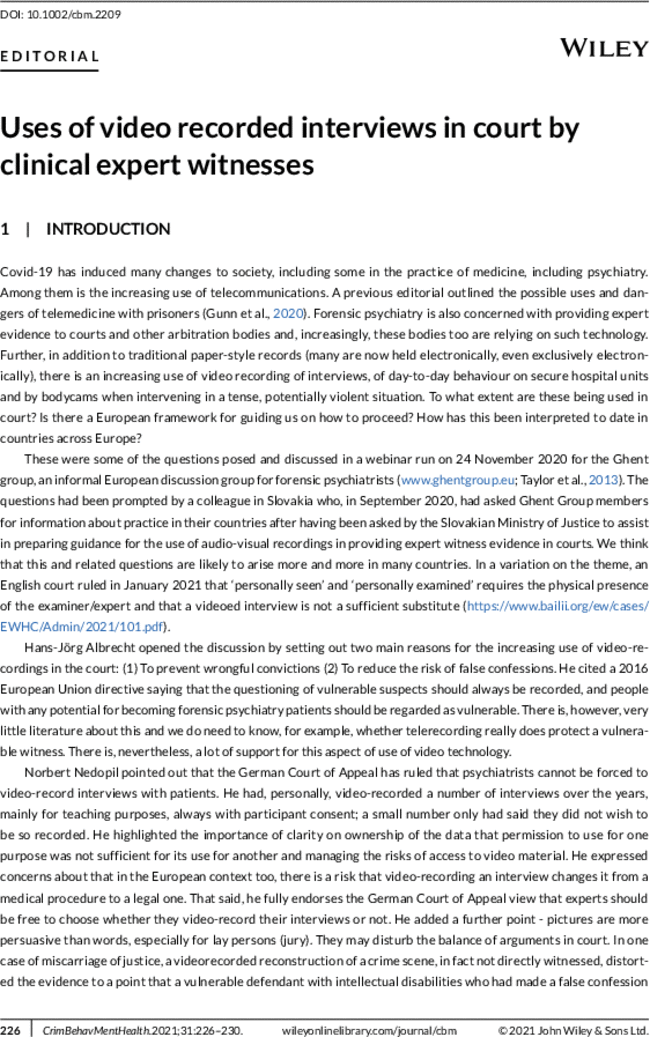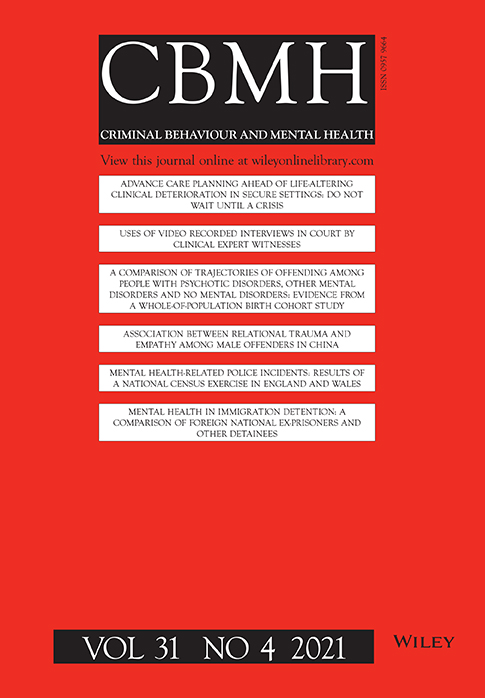Uses of video recorded interviews in court by clinical expert witnesses
Corresponding Author
John Gunn
King's College, London, UK
Correspondence
John Gunn, Emeritus Professor of Forensic Psychiatry, King's College, London, UK.
Email: [email protected]
Search for more papers by this authorHans-Jörg Albrecht
Max Planck Institute for the Study of Crime, Security and Law, Freiburg, Germany
Search for more papers by this authorAlec Buchanan
Division of Law and Psychiatry, Yale University School of Medicine, USA
Search for more papers by this authorCorresponding Author
John Gunn
King's College, London, UK
Correspondence
John Gunn, Emeritus Professor of Forensic Psychiatry, King's College, London, UK.
Email: [email protected]
Search for more papers by this authorHans-Jörg Albrecht
Max Planck Institute for the Study of Crime, Security and Law, Freiburg, Germany
Search for more papers by this authorAlec Buchanan
Division of Law and Psychiatry, Yale University School of Medicine, USA
Search for more papers by this author
Open Research
DATA AVAILABILITY STATEMENT
Data sharing not applicable-no new data generated, or the article describes entirely theoretical research.
REFERENCES
- AAPL Task Force. (1999). Videotaping of forensic psychiatric evaluations. Journal of the American Academy of Psychiatry and the Law, 27, 345–358.
- Bowen, P., Whitehead, S., & Centre for Justive Innovation. (2015). https://justiceinnovation.org/sites/default/files/media/documents/2019-03/problem-solving-courts-an-evidence-review.pdf
- Ellis, T., Shurmer, D. L., Badham-May, S., & Ellis-Nee, C. (2019). The use of body worn video cameras on mental health wards: Results and implications from a pilot study, Mental Health in Family Medicine, 15, 859–868.
- Gunn, J., Taylor, P. J., Forrester, A., Parrott, J., & Grounds, A. (2020). Telemedicine in prisons: A crime in mind perspective. Criminal Behaviour and Mental Health, 30, 65–67. https://doi.org/10.1002/cbm.2160
- Kmietowicz, Z. (2017). Body cameras on staff reduced attacks in psychiatric wards, finds study. BMJ, 357, j2268. https://doi.org/10.1136/bmj.j2268
- Southall, D., Plunkett, M. C. B., Banks, M. W., Falkov, A. F., & Samuels, M. P. (1987). Covert video recordings of life-threatening child abuse: Lessons for child protection. Pediatrics, 100(5), 735–760. https://doi.org/10.1542/peds.100.5.735
10.1542/peds.100.5.735 Google Scholar
- Sutherland, E. E. (2006). Undue deference to experts syndrome? Indiana International & Comparative Law Review, 16(2), 375–422.
10.18060/17519 Google Scholar
- Taylor, P. J., Wolfenden, N., & Nedopil, N. (2013). Forensic psychiatry training in Europe. Die Psychiatrie, 10(3), 181–187. https://doi.org/10.1055/s-0038-1670882
10.1055/s-0038-1670882 Google Scholar
- Tully, J., Fahy, T., & Larkin, F. (2015). New technologies in the management of risk and violence in forensic settings. CNS spectrums, 20(3), 287–294. https://doi.org/10.1017/S1092852915000279




